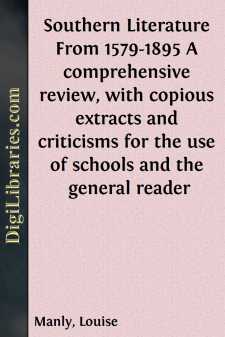Categories
- Antiques & Collectibles 13
- Architecture 36
- Art 48
- Bibles 22
- Biography & Autobiography 813
- Body, Mind & Spirit 142
- Business & Economics 28
- Children's Books 17
- Children's Fiction 14
- Computers 4
- Cooking 94
- Crafts & Hobbies 4
- Drama 346
- Education 46
- Family & Relationships 57
- Fiction 11829
- Games 19
- Gardening 17
- Health & Fitness 34
- History 1377
- House & Home 1
- Humor 147
- Juvenile Fiction 1873
- Juvenile Nonfiction 202
- Language Arts & Disciplines 88
- Law 16
- Literary Collections 686
- Literary Criticism 179
- Mathematics 13
- Medical 41
- Music 40
- Nature 179
- Non-Classifiable 1768
- Performing Arts 7
- Periodicals 1453
- Philosophy 64
- Photography 2
- Poetry 896
- Political Science 203
- Psychology 42
- Reference 154
- Religion 513
- Science 126
- Self-Help 84
- Social Science 81
- Sports & Recreation 34
- Study Aids 3
- Technology & Engineering 59
- Transportation 23
- Travel 463
- True Crime 29
Southern Literature From 1579-1895 A comprehensive review, with copious extracts and criticisms for the use of schools and the general reader
by: Louise Manly
Categories:
Description:
Excerpt
PREFACE.
T primary object of this book is to furnish our children with material for becoming acquainted with the development of American life and history as found in Southern writers and their works. It may serve as a reader supplementary to American history and literature, or it may be made the ground-work for serious study of Southern life and letters; and between these extremes there are varying degrees of usefulness.
To state its origin will best explain its existence. This may furthermore be of some help to teachers in using the book, though each teacher will use it as best suits his classes and methods.
The study of History is rising every day in importance. Sir Walter Raleigh in his “Historie of the World” well said, “It hath triumphed over time, which besides it nothing but eternity hath triumphed over.” It is the still living word of the vanished ages.
The best way of teaching history has of late years received much attention. One excellent method is to read, in connection with the text-book, good works of fiction, dramas, poetry, and historical novels, bearing upon the different epochs, and also to read the works of the authors themselves of these different periods. We thus make history and literature illustrate and beautify each other. The dry dates become covered with living facts, the past is peopled with real beings instead of hard names, fiction receives a solid basis for its airy architecture, and the mind of the pupil is interested and broadened. Even the difficult subjects of politics and institutions gradually assume a more pleasing aspect by being associated with individual human interests, and condescend to simplify themselves through personal relations.
To illustrate this method, which I have used with great success in teaching English History:
In connection with the times of the early Britons, read Tennyson’s “Idyls of the King.”
At the Norman Conquest, Bulwer’s “Harold.”
At the reign of Richard I. (Coeur de Lion), Scott’s “Ivanhoe” and “Talisman,” Shakspere’s “King John.”
At the reign of Elizabeth, Scott’s “Kenilworth,” the non-historical plays of Shakspere, as he lived at that epoch, Bacon’s Essays, and others.
I mention merely a few. The amount of reading can be increased almost indefinitely and will depend on the time of the pupil, the plan of the teacher, and the accessibility of the books. Most of the books necessary for English History are now published in cheap form and are within reach of every pupil.
A great deal of reading is very desirable; it is the only way to give our pupils any broad view of literature and history, and to cultivate a taste for reading in those destitute of it. It is often the only opportunity for reading which some pupils will ever have, and it lasts them a life-time as a pleasure and a benefit.
The reading may be done in the class or out of school hours. It is well to read as much as practicable in class, and to have some sketch of the outside reading given in class....


